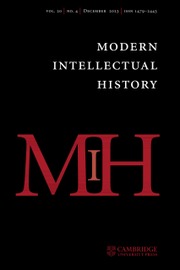(image source: Cambridge Core)
Abstract:
According to a dominant narrative, the concept of popular sovereignty was joined to the notion of public opinion during the French Revolution to form the blueprint of a liberal constitutional state. This article shows how, after the Revolution, Benjamin Constant, who is now recognized as a founding figure of “liberalism,” used public opinion as a substitute for popular sovereignty to theorize political legitimacy and constitution making. I show why and when Constant discussed popular sovereignty, namely to dismiss it as an unhelpful and dangerous fiction in answer to factions invoking the concept to revolutionize the political order, or rulers such as Napoleon using it to claim absolute power. In parallel, I explain how Constant designed his alternative, opinion-based theory of legitimacy in the 1790s, before pragmatically adapting it over the course of his career as political regimes changed in France. Constant's substitution of public opinion for popular sovereignty, I contend, reveals distinct views on what makes a political regime legitimate and the meaning of constitutional changes. I conclude with a discussion of how Constant's views, thus interpreted, throw light on debates about sovereignty and public opinion in modern political thought.
(source: Cambridge Core; DOI 10.1017/S1479244320000311)


No comments:
Post a Comment